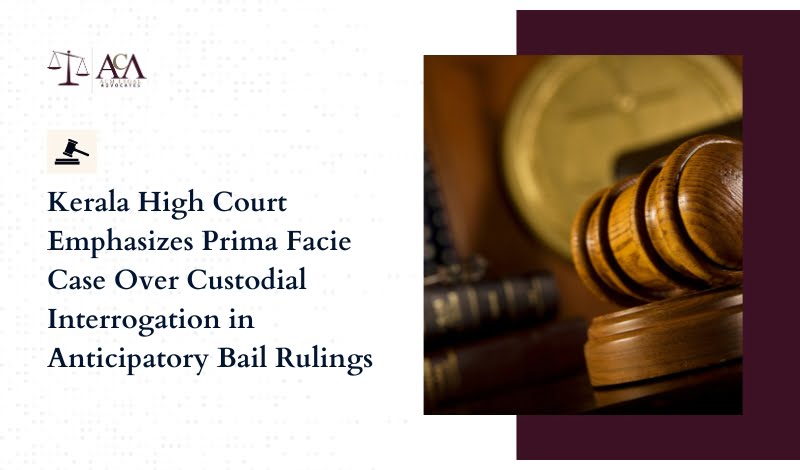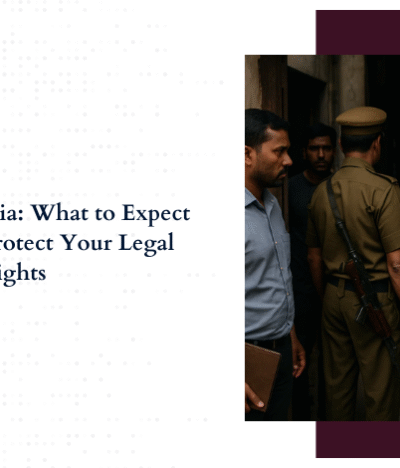On June 3, 2024, the Kerala High Court delivered a significant judgment in Bail Application No. 2418 of 2024, wherein the court emphasized that the non-requirement of custodial interrogation is not a sufficient ground for granting anticipatory bail. This ruling came in the case of Prabhakaran P. vs. the State of Kerala, where the petitioner sought pre-arrest bail under Section 438 of the Code of Criminal Procedure. The judgment, delivered by Honourable Mr. Justice A. Badharudeen, sets a precedent in the interpretation of anticipatory bail laws in cases involving serious allegations.
Case Background
The petitioner, Prabhakaran P., a 65-year-old individual, was accused in Crime No. 245/2024 of the Parippally Police Station, Kollam. The allegations included offenses under Sections 354A(1)(i), 354A(1)(ii), and 354 of the Indian Penal Code, as well as under various sections of the Protection of Children from Sexual Offences (POCSO) Act, 2012, and the Juvenile Justice (Care and Protection of Children) Act, 2015. The prosecution alleged that on March 6, 2024, the petitioner, who is the principal and teacher at Atlas Education Centre, Chirakkara, made inappropriate advances towards a ninth-grade student attempting to sexual and physical contact.
Arguments Presented
The petitioner’s counsel argued that the allegations were false and that the petitioner had a perfect record of running the tuition center for 38 years. The counsel emphasized that no previous complaints had been made against the petitioner, suggesting that the current accusations were fabricated. Furthermore, it was argued that the allegations, even if taken at face value, did not warrant the detention of the petitioner. The defence offered full cooperation with the investigation and requested anticipatory bail.
On the other hand, the counsel for the complainant argued that the nature of the allegations, including repeated inappropriate behavior and attempts at physical contact, necessitated the custodial interrogation of the accused to ensure a thorough investigation. The prosecution highlighted the trauma suffered by the victim and the immediate reporting of the incident as factors underscoring the seriousness of the case.
Court’s Analysis and Decision
Justice A. Badharudeen referred to the Supreme Court’s judgment in Sumitha Pradeep v. Arum Kumar C.K. and Another, which set a precedent that in cases involving serious allegations, the High Court should not grant anticipatory bail merely because custodial interrogation is not required. The Supreme Court had emphasized that the primary consideration in such cases should be the prima facie evidence against the accused, the nature of the offence and the severity of the punishment.
In this context, the court highlighted that the victim, a 9th standard student, had reported the incidents immediately, which included inappropriate remarks and physical advances by the accused on March 1, 2024, and March 6, 2024. Given these factors, the court underscored that the investigative process should not be hindered by granting anticipatory bail, especially when the allegations had a significant impact on the victim’s well-being and academic pursuits.
Judgment and Implications
In light of the above considerations, it was concluded that the non-requirement of custodial interrogation alone is not a valid ground for granting anticipatory bail. The court dismissed the bail application stating that:
- The prima facie case against the accused was substantial.
- The nature of the offenses and the severity of the punishment warranted denial of anticipatory bail.
- Custodial interrogation, although not always required, cannot be disregarded if it serves the interest of a thorough investigation.
The court also emphasized the need for a free and unhindered investigation, particularly in cases involving serious offenses under the POCSO Act and Juvenile Justice Act. This decision underscores the judicial commitment to ensuring that allegations of sexual misconduct, especially against minors, are thoroughly investigated without undue interference.
Conclusion
This ruling serves as a critical reminder of the principles governing anticipatory bail in India. The decision highlights the importance of assessing the prima facie case and the nature of the allegations before granting anticipatory bail, rather than relying solely on the non-requirement of custodial interrogation. This judgment reinforces the need for a balanced approach in bail matters, ensuring that the rights of the accused are weighed against the necessity of a comprehensive investigation, particularly in cases involving serious offenses such as those under the POCSO Act.
The case of Prabhakaran P. vs. State of Kerala sets a precedent for future bail applications, emphasizing that the judicial system must prioritize the integrity of the investigative process and the protection of victims, especially minors. By denying anticipatory bail in this instance, the court has underscored its commitment to a fair and thorough judicial process, aligning with the legislative intent of protecting vulnerable populations from sexual offenses.
This ruling not only impacts the immediate case but also serves as a guideline for similar cases, ensuring that anticipatory bail is not granted on insufficient grounds.





